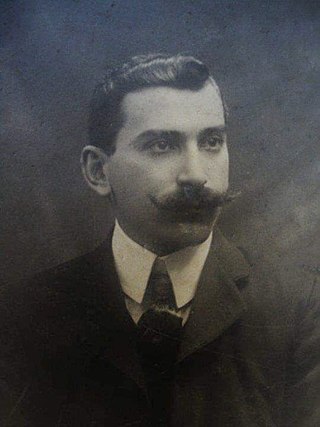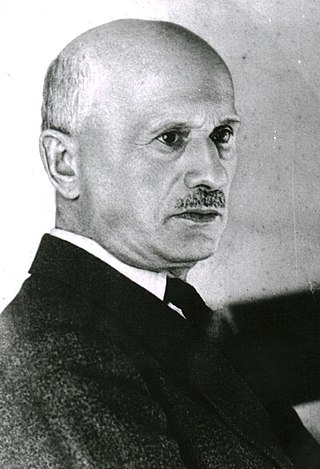Related Research Articles

Luigj Gurakuqi was an Albanian writer and politician. He was an important figure of the Albanian National Awakening and was honoured with the People's Hero of Albania medal.

Idhomen Jovan Kosturi, also known as Idhomeno Kosturi, was an Albanian politician, regent and once acting Prime Minister of Albania. He would become the second representative of Albanian Orthodox population to become head of the Albanian government, after Pandeli Evangjeli. Kosturi was also among the contributors to the first Albanian teachers' school, the Shkolla Normale e Elbasanit, a teacher training institution that was founded on 1 December 1909 in Elbasan.

The Albanian Declaration of Independence was the declaration of independence of Albania from the Ottoman Empire. Independent Albania was proclaimed in Vlorë on 28 November 1912. Six days later the Assembly of Vlorë formed the first Government of Albania which was led by Ismail Qemali and the Council of Elders (Pleqnia).

Dhimitër Tutulani, also known as Taq Tutulani or Dhimitraq Tutulani, was an Albanian lawyer and politician from city of Berat. He was one of the signatories of the Albanian Declaration of Independence.

Babë Dud Karbunara, born Jorgji Karbunara was an Albanian teacher and politician. He was one of the signatories of the Albanian Declaration of Independence.

Abdyl Aziz Vehbi Dibra Agolli was an Albanian Islamic scholar and politician. He served as the first grand mufti of the Muslim Community of Albania.

Lef Nosi was an Albanian publisher, archivist, philologist, folklorist, ethnographer, numismatist, archaeologist and politician. On 28 November 1912, he was as one of the signatories of the Declaration of Independence, representing Elbasan. During the Second World War, Nosi was a leading member of Balli Kombëtar and was chosen as a member of the Albanian High Council.

Elmas Boçe was an Albanian educator and a signatory of the Albanian Declaration of Independence.

Petro Poga (1860–1944) was an Albanian politician who served as a delegate at the Albanian Declaration of Independence event in Vlorë, 1912, and an important Rilindas.
Ajdin Draga (1864–1914) was an Albanian politician. In 1912, he was a representative of Kosovo in the Albanian Declaration of Independence and a member of the Albanian Senate.

Eqrem Bey Vlora was an Albanian lord, politician, writer, and one of the delegates to the Assembly of Vlorë, which proclaimed the Albanian Declaration of Independence on November 28, 1912. He is described as The Last of Beys, the embodiment of the Albanian aristocracy of the time, although he came from a caste founded on the principles of Ottoman military fief.

Omer Pasha Vrioni II (1839–1928), also referred as Ymer or Omar, was an Albanian ruler from one of the most powerful Albanian families of the 19th century. He founded the city of Fier.

Sami Bey Vrioni (1876–1947) was an Albanian politician, diplomat, and a delegate at the Assembly of Vlora which declared the Albanian Declaration of Independence. He was a respected and powerful landowner in the Fier region of Albania.

Xhemil Dino (1894–1972) was an Albanian politician and diplomat.

The All-Albanian Congress, Albanian National Congress, or Albanian Independence Congress was a held in Vlorë on November 28, 1912. Congress participants constituted the Assembly of Vlorë which established Albanian Provisional Government and elected Ismail Qemali as its president.
The Assembly of Vlorë was an Albanian assembly constituted during the All-Albanian Congress in Vlorë, on November 28, 1912.

The Ministry of Finances and Economy is a department of the Albanian Government, responsible for matters relating to economic policy, the central government budget, taxes, banking, security and insurance, international economic work, central, regional and local government.

Independent Albania was a parliamentary state declared in Vlorë on 28 November 1912 during the First Balkan War. Its assembly was constituted on the same day while its government and senate were established on 5 December 1912.
The Elderly Assembly was a senate of Albania which independence was declared on 28 November 1912 in Vlorë. The senate was established on the 4 December 1912 by the Assembly of Vlorë. It was composed of 18 members of the assembly and had advisory role to the government of Albania.
The Second Congress of Manastir was an Albanian congress held on 2–3 April 1910 in Manastir, back then Ottoman Empire, today's Bitola in the Republic of North Macedonia. It dealt with the challenges that the Albanian language and schools faced at the time within the context of the empire, and the platform to overcome them.
References
- ↑ "History of Albanian People" Albanian Academy of Science. ISBN 99927-1-623-1
- ↑ Nosi, Lef. "Dokumenta historike për t'i shërbye historiës tone kombëtare". Archived from the original on 12 October 2014. Retrieved 24 November 2012.
- ↑ Schmidt-Neke, Michael (1987). Enstehung und Ausbau der Königsdiktatur in Albanien, 1912-1939. Oldenbourg Wissenschaftsverlag. p. 321. ISBN 978-3-486-54321-6 . Retrieved 5 February 2012.
Senat (Pleqësi) von 1912...